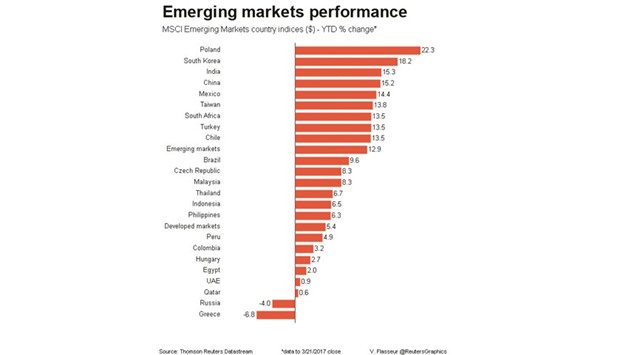Emerging assets slipped yesterday after a slide on Wall Street, with stocks snapping an eight-day winning streak, though the South African rand briefly firmed after data showed a narrower current account gap.
MSCI’s emerging equity index retreated almost 1% after its longest streak of gains since last August, hit by losses on US stocks as doubts grew about President Donald Trump’s ability to implement spending and tax cut pledges that were aimed at accelerating economic growth.
While the dollar and US Treasuries also slipped, emerging currencies were broadly weaker, especially in Asia, while emerging sovereign dollar bond yield spreads widened four basis points to 310 bps over Treasuries, the widest in a week The rand firmed as much as 0.4% to the dollar after data showed South Africa’s current account deficit narrowed to just 1.7% of GDP towards end-2016, and annual inflation slowed.
The rand later ceded the gains.
Benchmark government bond yields slipped to eight-month lows. “The rand has been supported by the commodity rally.
Partly that’s the reason why CPI came in a bit lower — because the rand is stronger than expected,” SEB analyst Per Hammarlund said, attributing the current account improvement also to stronger commodity exports and weak domestic demand.
“I don’t think it has really turned a corner — it’s not a structural improvement in South Africa, it’s more the commodity cycle that it’s gaining from right now.”
Russian bond yields meanwhile inched off three-year lows, stocks fell 0.5% and the rouble slipped from five-week highs before this Friday’s central bank meeting that is likely to hold interest rates at 10%. Fifteen of 25 analysts polled by Reuters predict an on-hold decision, despite easing inflation and fresh data that showed anaemic wage growth and falling retail sales.
Most other emerging European currencies retreated, mirroring earlier weakness in Asia.
Analysts at ING warned that emerging markets may not benefit from the latest declines in dollar and US yields.
“Currently declining Treasury yields are challenging for EM currencies as this is caused by uncertainty about the US growth outlook (and thus global growth),” they wrote.
Focus in central Europe was on a Czech bond auction that is likely to be heavily bid as investors pile into crown-denominated assets before the expected removal of an exchange rate cap.
Foreigners hold around 40% of Czech bonds, double year-ago levels, hoping to capitalise on a firmer crown.
The crown eased slightly in three-month forward markets after Tuesday’s renewed surge to three-year highs against the dollar.
Hammarlund said forwards trade had effectively dried up because “the left-hand side has gone. There might be some price but there’s no one trading it anymore as no one wants to take the other side of the bet.”

.
